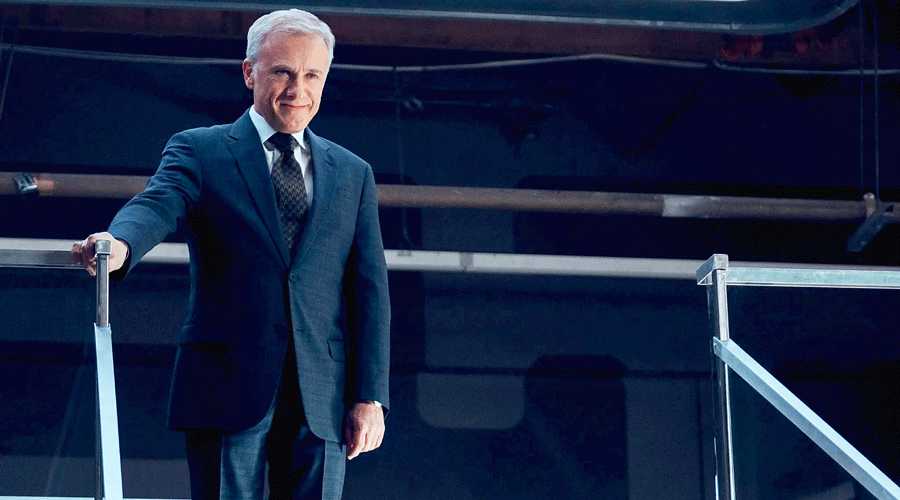Christoph Waltz knows a few things about acting, and he has the Academy Awards to prove it. Yet in a recent conversation, he made light of the skills required.
“I don’t believe in good actor, bad actor,” he said. “If you’re playing an interesting part in a worthwhile story and you’re cast properly, you’d have to be a complete idiot to not be good.”
It is difficult to tell how serious Waltz is when he makes this type of deliciously arch grand statement, just as it is difficult to pinpoint what exactly drives his latest screen creation — the title character of the satirical new Amazon workplace thriller The Consultant.
Adapted by the Servant creator Tony Basgallop from the 2015 novel by Bentley Little, the eight-episode series tells the story of a video game studio after the sudden, violent death of its young founder, which sends the company into a tailspin. Out of nowhere, an offputting stranger named Regus Patoff (Waltz), who claims to be a hired consultant from Crimea, appears and takes over. It is obvious immediately that something is a little off — or maybe a lot.
Like many of Waltz’s best known characters, Regus is unfailingly soft-spoken and courteous — even when firing a guy for how he smells — as was Waltz, himself, on a recent morning in the Drawing Room of the Greenwich Hotel, in Lower Manhattan. And yet there is usually a wry edge to what he does, which often plays as ruthless in his characters, not least the two for which he won Oscars: an SS officer in Quentin Tarantino’s Inglourious Basterds and a bounty hunter in Tarantino’s Django Unchained.
His character stays true to form in The Consultant, which he described as “the first series that I’ve done”. That isn’t entirely accurate — he has had many guest spots and he had regular roles in a few European series decades ago — but it is the first time Waltz, 66, has carried a modern Hollywood series, and with a role so thoroughly Waltz-like. (A series of Quibi short-shorts in which he starred, Most Dangerous Game, has since been condensed into a film.) Regus is as seductive as he is ominous, a frightening mix of outwardly pleasant and subtly menacing, a balance that Waltz has perfected over the years.
“On the page the character is very harsh and forthright, but onscreen there’s only so far you can go in being nasty,” Basgallop, who is also the showrunner, said in a video conversation. “You also have to have a lot of charm, which I think Christoph brought to it.”
In person, that edge Waltz brings to his roles is the furthest thing from menacing, but it does make for good sport. He is intellectual, playful, a little mischievous — as likely to challenge a question as to answer it. A man of wide-ranging interests, he quoted or paraphrased Stanley Kubrick, Charles Eames, Albert Einstein, Timothy Snyder, Aristotle and Stephen Sondheim in the course of an 80-minute conversation.
‘MARKET-ECONOMY VOCABULARY’
In a typical rally, he hit a deceptively gentle lob back over the net after being asked if he had ever felt he nailed a scene or role.
“All this market-economy vocabulary: ‘nailed it,’” he said. “Well, if you nail it, where do you nail it to? What kind of nail do you use? Why nail it in the first place? It can’t go anywhere anymore. Wouldn’t it be the goal to keep it flowing?”
He leaned back in his seat, smiling like the Cheshire Cat. Born and raised in Vienna, Waltz spent decades bouncing around Europe in the workaday worlds of theatre and television, doing the occasional film before landing his breakout role, in Inglourious Basterds, which debuted when he was 52. At the time, he told The New York Times that after acting in a lot of comedies, playing the villain had become “sort of the flavor of the past few years”.
Most of it wasn’t particularly rewarding, but his relationship with Tarantino freed him to combine his facility for both comedy and villainy in more interesting ways — and to be choosier. It also brought him to Los Angeles, where he has been living full-time since the mid2010s. (Just before the pandemic, he added American citizenship to his Austrian and German ones: “I very much believe in this old dictum of no taxation without representation,” he said, “and I wanted to be represented because I pay a lot of taxes here.”)
With a successful run of films with some of the world’s biggest directors under his belt (Wes Anderson, Guillermo Del Toro and Cary Joji Fukunaga among the most recent), he hesitated, at first, to sign on for a TV show. Television requires a particular leap of faith, he said, that films do not.

Christoph Waltz meeting fans. File picture
“They ask you to do a whole series but you don’t get anything but the pilot,” Waltz said. It was an experience he had never had before, and he described it with an unlikely metaphor.
“The fastest animal is an alligator, but only for five metres,” he informed me. “So I thought, ‘What kind of alligator is that, jumping at me?’”
Waltz has credited his analytical approach to acting, in part, to the technique of script interpretation taught by Stella Adler, to which he was exposed during a stint in New York beginning in the late 1970s. In his analysis, the power of his character in The Consultant rests in little more than people’s eagerness to follow someone who assumes an air of authority.
“He never says, ‘I am the boss’ — he just acts like a boss and everybody immediately accepts it,” Waltz said.
‘WHEN HE SPEAKS, YOU LISTEN BECAUSE YOU KNOW IT’S HEARTFELT’
He segued to Representative George Santos of New York, who has built a career on brazen lies and self-confidence — but is still standing, even after being exposed.
“He should be sitting in a quiet corner, hoping that this thing passes,” Waltz marvelled with a gleam in his eye, like a gourmand about to dig into a particularly elaborate dessert. “Now it is pathology, clearly.”
Waltz is interested in what makes people tick, but that doesn’t mean he wants to find an explanation or a meaning behind every decision he makes as an actor. Or at least he doesn’t want to dwell on it publicly.
“I don’t talk about the process — or sometimes have a, let’s say, ironic distance to disclosing the process — because it’s a very personal thing,” he said. “You follow inklings that you don’t know where they’re coming from.”
Regus is the latest in a line of roles in which Waltz deploys an unshowy virtuosity: He does a lot with little. (“It’s about the viewer, not the actor,” he said. “I’m not interested in seeing the actor work; I’m interested in forgetting about the actor altogether.”) Still, getting there takes plenty of experimentation and conversation that you don’t see onscreen. Waltz’s colleagues described him on set as collegial, honest and down to earth.
“When he speaks, you listen because you know it’s heartfelt — you don’t think he’s trying to sell you something or trying to convince you of something,” Basgallop said. “He brings that to his characters as well — someone who has a very strong intellect but is also very calm and measured.
“For some reason I think human beings find that terrifying: We’re programmed to be scared of someone like that because they can outthink us.”
It’s tempting to draw parallels between Regus’s hold on the video game company’s staff and the one the best actors have on their audiences — and, evidently, on some of their colleagues.
In a phone conversation, Nat Wolff, 28, who plays a coder, recalled shooting scenes in which his and Waltz’s characters take off on a bonding expedition. At the end of a busy day, Wolff said, Waltz volunteered some feedback.
“He turned to me and he said, ‘You were …’ He took a long pause while I felt my anxiety rising, and then he went ‘ … exquisite today’,” he said. “I really wanted to get his approval, like a paternal figure.”
The anecdote illustrates Waltz’s dry humour and precise timing, as well as the way he envisions the best conversations: as impish dialectic. Wolff recalled telling Waltz that he had wanted to get a puppy.
“And he said, ‘Think about it from the puppy’s point of view,’” Wolff said, imitating his co-star’s German accent. “‘You’re going to be off on set and the puppy is going to be thinking, Where’s Nat?’”
“So I didn’t get a puppy,” he added, laughing. “Whatever Christoph says, you listen to and you follow.”
The New York Times News Service











